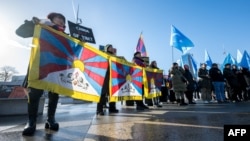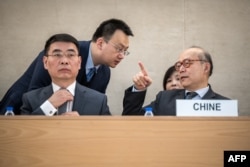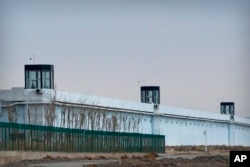China’s human rights record was the focus of intense scrutiny Tuesday by the U.N. Human Rights Council, where Beijing faced criticism from Western democratic societies over its treatment of Uyghurs, Tibetans and dissidents in Hong Kong.
Tuesday’s meeting marked the fourth time that China’s rights record has been examined by the council’s Universal Periodic Review procedure and the first time since former High Commissioner for Human Rights Michelle Bachelet issued a blistering report on China’s treatment of Uyghurs and other Turkic Muslims in China’s western Xinjiang region.
The report, which Bachelet released just minutes before she left her post as high commissioner on September 1, 2022, accuses China of having committed “serious human rights violations” against the Uyghurs that might amount to crimes against humanity, allegations that China rejected then and rejects now.
“We strive to deliver a better life for all people. China sees peoples’ aspirations for a better life as the focus of our efforts,” said Chen Xu, China’s permanent representative to the United Nations in Geneva and head of its 60-member delegation.
“No one is left out or left behind as China builds a modern socialist country in all respects. The people of all ethnic groups are equal and closely united like the seeds of the pomegranate working together for common prosperity and development and for a better life for all,” he said.
U.N. experts and human rights organizations accuse China of incarcerating more than a million Uyghurs and other Muslim minorities in so-called vocational centers and of subjecting them to systematic, widespread abuse.
Charges such as those were categorically denied by a member of China’s delegation at the council hearing Tuesday: “We respect and protect their human rights. We maintain Xinjiang’s social stability. We guarantee their right to life.”
The official said, “In Xinjiang, we combat terrorism according to the law. For seven years there have been no cases of violence and terror. The society enjoys stability and a good life.”
China’s delegation also dismissed international criticism of the government’s harsh crackdown on pro-democracy parties in Hong Kong since its takeover of the territory.
“Since the establishment of Hong Kong’s special administrative region in 1997, the principle of one country, two systems has been the cornerstone of our prosperity and stability,” said Chan Kwak-ki Eric, chief secretary for administration, Hong Kong.
He accused pro-democracy forces of violent, chaotic behavior. “With the implementation of the national security law, the days of social disturbance and fear are over. Stability as well as law and order has been restored and our city is back on track,” he said.
Since more than 160 countries signed up to speak at the UPR, each representative was limited to 45 seconds. This created a somewhat unsettling form of human rights “speed-dating” in which delegates rushed through their questions, concerns and recommendations.
Many countries, among them several Muslim countries, went along with China’s glowing account of its achievements and efforts to better promote and protect human rights at home. When it came time for them to speak, those friendly countries gave China an easy ride.
They congratulated China on its accomplishments and offered recommendations on issues such as ways to pursue development prospects, preserve the cultural identities of minorities and promote cultural diversity.
Western democracies, on the other hand, were forthright with their concerns, criticisms and demands that China change its ways.
Simon Manley, the United Kingdom’s ambassador to the U.N. in Geneva, demanded that China “cease persecution and arbitrary detention of Uyghurs and Tibetans and allow genuine freedom of religion or cultural expression without fear of surveillance, torture, forced labor or sexual violence.”
The U.S. ambassador to the United Nations in Geneva, Michele Taylor, raced through her intervention to get everything she had to say within the 45 seconds allotted to her. She called for the release of all arbitrarily detained individuals and called on China to “cease harassment, surveillance and threats against individuals abroad and in China, including Xinjiang, Tibet and Hong Kong.”
She demanded an end to torture, persecution throughout China, forced labor and marriage. She condemned “the ongoing genocide and crimes against humanity in Xinjiang, human rights abuses in Tibet, Inner Mongolia and across China.”
While delegates were verbally sparring with China and one another inside the council chamber, several human rights groups, including the Tibet Advocacy Coalition, the World Uyghur Congress and human rights defenders in Hong Kong were demonstrating against China outside the U.N. building.
Dolkun Isa, president of the World Uyghur Congress who was present at the UPR, reprimanded Muslim countries who applauded China’s development efforts “without a mention of religious and cultural persecution of Uyghurs.”
“The UPR was an opportunity for us to identify those with moral dignity and those who decide to look the other way in the face of genocide,” he said. “We know who those are.”







